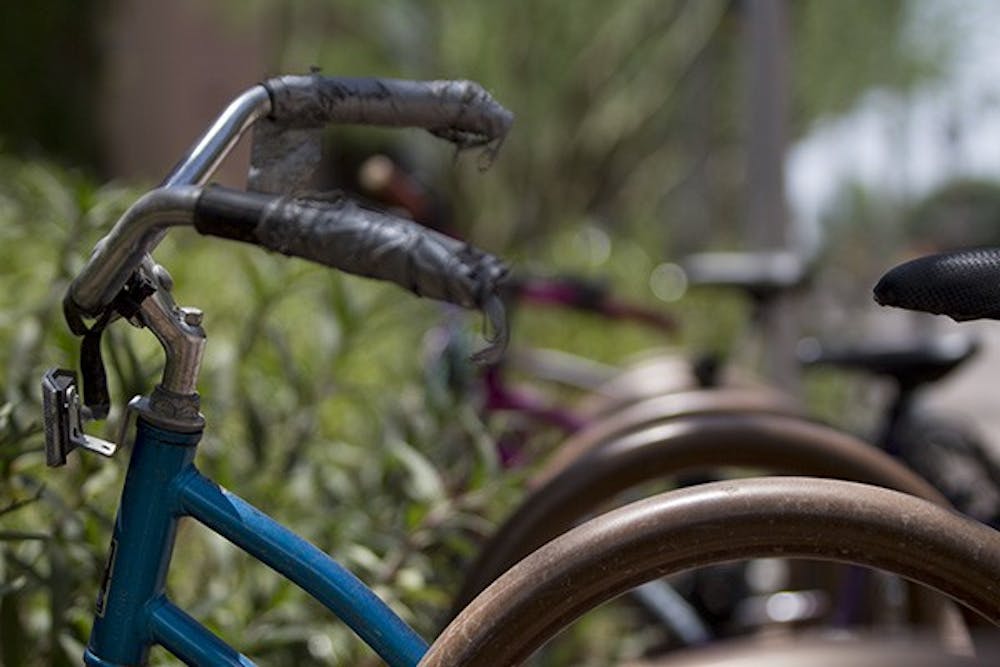 In an effort to deter bicycle thefts, the University plans to open a new card-access bicycle storage facility near Payne Hall on the Tempe Campus on Nov. 4. (Photo by Dominic Valente)
In an effort to deter bicycle thefts, the University plans to open a new card-access bicycle storage facility near Payne Hall on the Tempe Campus on Nov. 4. (Photo by Dominic Valente)A Tempe city councilman and a state representative have proposed a law change that would change bicycle theft on campus from a class 1 misdemeanor to a class 6 felony.
Rep. Andrew Sherwood, D-Tempe, proposed the law change, which would amend current code, which states that theft of an object that costs under $1,000 is a misdemeanor.
The change would only apply to school campuses, including colleges, where bicycles tend to be a person’s main form of transportation, said Tempe City Council Member Kolby Granville.
Granville said curbing bicycle theft has been a priority for him since he was elected in 2012.
“Stealing bikes is a very profitable crime,” Granville said. “Statistically, a person can steal about 80 to 100 bikes before they get caught. If you are stealing bikes and selling them for $50 each, you’ve already made $5,000 before you even get caught.”
Under the current law, the usual penalty for a class one misdemeanor is a fine of around $200, which Granville says is not enough of a deterrent for people who may be making money off stolen bikes.
For many people, especially students who may not have a car or choose not to drive one, a bicycle can be a main form of transportation and can be devastating to lose, Granville said.
“For a lot of people who use their bike as a main form of transportation, the value of the object is more than the cost of the object,” Granville said.
He proposed a change last year that would increase the punishment for stealing a bike that was a primary form of transportation, but police opposed it because there would be no way for a thief to know if a bike was a primary form of transportation. Granville said, so far, police have been more supportive of this proposal.
Students had mixed reactions to the proposed change, agreeing something needed to be done to discourage thieves, but were unsure if felony designation was too harsh of a penalty.
Aviation management sophomore Michael Dunn said he would be upset if his bike got stolen, but thought it was too small a crime to merit a felony charge.
“I think a felony might be a little overboard,” Dunn said. “I would be upset, but I think there are worse crimes than stealing a bike.”
Granville said most people arrested in connection with bike theft are generally career criminals, using the money from stolen bikes to fund drug addictions or other illegal enterprises.
“If you are stealing bikes as an adult, you are using the money to fund something illegal,” Granville said. “If police catch someone stealing bikes, they will get a search warrant and search the person’s house. Usually they find items from more serious crimes like drugs or weapons.”
Supply chain management junior Brianna Bordasch said she thought a felony might be too strong of a punishment for stealing a bike.
“If someone stole my bike, I would think they were a real jerk, but I don’t think someone should necessarily go to jail or anything for it,” Bordasch said. She agreed, however, that a $200 fine was not enough to discourage someone from stealing a bike.
From 2012 to 2013, 681 bicycles were reported stolen in Tempe, an increase from 615 the previous year. From 2012 to 2013, 52 people were arrested for the crime, an increase from 23 the year before, according to statistics from the city of Tempe.
Granville credits the increase in arrests to greater police involvement and interest in enforcing the crime.
“Police have started different ways of knowing that a bike is stolen, as well as a bike nabbing patrol,” Granville said. “It’s good for police, too, because it’s a common crime but not one that they generally are too interested in.”
Reach the reporter at cvanek@asu.edu or follow her on Twitter @CorinaVanek.
Like The State Press on Facebook and follow @statepress on Twitter.




